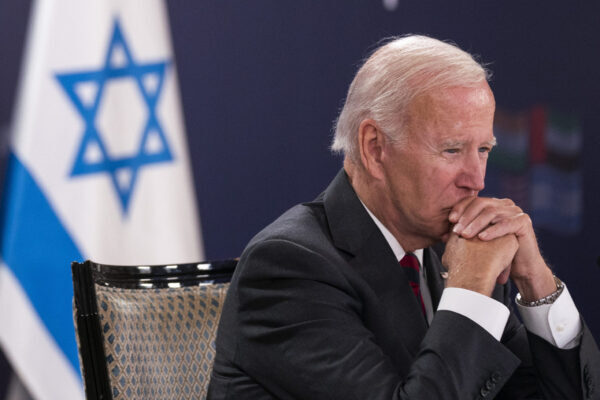As the relationship between President Biden and Israel’s Prime Minister Benjamin Netanyahu has grown increasingly fraught and tense, a looming ground incursion into Gaza’s southernmost city has emerged as a new flashpoint — threatening to turn the allies even further against each other.
Biden said Monday he has not had what he called a “come to Jesus meeting” with Netanyahu that he was heard speaking about on a hot mic as he spoke with lawmakers after his State of the Union address on Thursday.
But he is leaving that option on the table.
“We’ll see what happens,” Biden said when asked if he still planned to have that conversation.
The two have not spoken since February.
In an interview with MSNBC on Saturday, Biden said an Israeli invasion of Rafah, where more than a million Palestinians are currently sheltering, would be a “red line” before immediately appearing to walk back his comments.
Exactly what the consequences would be were unclear because at the same time he said, “I’m never gonna leave Israel. The defense of Israel is still critical.”
Nevertheless, a defiant Netanyahu shot back at Biden in a separate interview, vowing to charge ahead.
“We’ll go there,” the prime minister said. “You know, I have a red line. You know what the red line is? That October 7 doesn’t happen again. Never happens again.”
On Monday, Washington officials attempted to clean up the president’s comments — explaining that the administration would support an incursion into Rafah if Israel presented a plan to prevent civilian suffering first, but that it had yet to review any proposal.
State Department spokesperson Matthew Miller declined to say whether Israel would face any consequences if it proceeded into Rafah without satisfying that requirement or share details on what commitments the U.S. was hoping to extract ahead of an incursion.
“Let’s wait and see what it is that they come up with,” Miller said.
The administration attempting to position itself as an authority that can either approve or reject plans for Israeli military operations is a significant pivot in its approach to conflict.
U.S. officials previously encouraged a degree of separation between the countries — concerned they would be seen as directly culpable for collateral damage in Gaza if they played a hand in devising war plans.
Ironically, the Biden administration’s newfound desire to be intertwined in Israeli military schemes comes as the rift between the countries’ leaders seems to be growing.
According to White House deputy press secretary Olivia Dalton, Biden hasn’t spoken to Netanyahu in nearly a month. And although Secretary of State Antony Blinken has journeyed to Israel five times since Oct. 7 — making an appearance in the country roughly every four weeks — he has not paid a visit since early February and has no immediate plans to do so.
As private conversations between leaders have become scarce, Biden and Netanyahu have become increasingly outspoken in public, signaling opposing positions through the press.
“This exchange of different views via the media highlights gaps that have been emerging for several months now,” said Brian Katulis, a senior fellow for U.S. foreign policy at the Middle East Institute and a former National Security Council official.
He argues the divide has been exacerbated by domestic politics inside both countries, and that it is likely to continue unless Biden and Netanyahu can find common ground on short-term issues, like humanitarian aid delivery, as well as the U.S.’ long-term ambition to establish a Palestinian state.
Steven A. Cook, a senior fellow for Middle East and Africa Studies at the Council on Foreign Relations, argues Biden and Netanyahu are poised to move further away from each other on both fronts.
“Israel’s planned assault on the city of Rafah promises to make the humanitarian situation worse,” he said. “Palestinians in Gaza are confronted with the fact that there is no place left for them to seek safety.”
And Cook said that even though Biden has now “put his administration squarely behind the idea of two states—Israel and Palestine,” the odds of reaching the diplomatic goal are extremely low.
“Opposition to a two-state solution has only increased among the Israeli public since the war with Hamas began,” he said.
ABC NEWS


Leave a Reply
You must be logged in to post a comment.